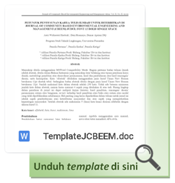COMMUNITY PARTICIPATION IN WASTE MANAGEMENT IN CHANGWON CITY, SOUTH KOREA
DOI:
https://doi.org/10.23969/jcbeem.v4i1.2336Keywords:
community participation, government policy, waste handlingAbstract
Changwon City, located in the southern central region of Gyeongsangnam-do in South Korea, has become a major center of industrial economy in the central region of Gyeongnam. To achieve good waste management can be done by handling: institutional aspects, financial aspects, regulatory aspects (legal), aspects of community participation, and operational technical aspects. The purposes of this research are to find out the participation of the community in Changwon City, South Korea and to investigate the type of management carried out in Changwon City, South Korea. The literature study method uses secondary data from Changwon City, South Korea and several studies on waste management to support and supplement information from the interviews. Government of South Korea adopted the concept of a volume-based waste fee system and collecting the recyclable waste, which is a volume-based waste disposal system, where each citizen has to pay for every plastic waste that will be used. The greater the waste production will need the greater the costs. Communities are required to sort out their waste before putting it in a plastic bag according to the type of waste, especially waste that can still be recycled. Korea has also established an expanded producer responsibility system and recycles its construction waste. Korea's waste information system has resulted in cost savings, promoted transparency, and eliminated illegal waste disposal. The effects of this policy include reducing the production of solid household waste, contributing to the completion of separate disposal, collecting waste and recyclable goods securing the cost of waste treatment from the benefits of the VBWF system and economic utilization.
Downloads
References
“Changwon Waste and Recycling” (online) https://www.changwonderful.com/changwon-waste-and-recycling/. Accessed 15 February 2020.
“Changwon Garbage Disposal” (online) dari https://www.changwon.go.kr/. Accessed 15 February 2020.
“Germany recycles more than any other country” (online) dari https://www.weforum.org/agenda/2017/12/germany-recycles-more-than-any-other-country/. Accessed 15 February 2020.
Hendra, Y. 2016. “Perbandingan Sistem Pengelolaan Sampah Di Indonesia Dan Korea Selatan: Kajian 5 Aspek Pengelolaan Sampah.” Aspirasi, Vol. 7 No. 1 Juni 2016.
Kaza, S. Dkk. 2018. What a waste 2.0 A Global Snapshot of Solid Waste Management to 2050. World Bank group.
Shin Lee. 2016. Volume Based Waste Fee (VBMF) System for Municipal Solid Waste. SMG Policies That Work.
SNI 3242:2008 tentang Pengelolaan Sampah di Permukiman.
Sugiyono. 2018. Metode Penelitian Kuantitatif, Kualitatif, dan R&D. Bandung: Alfabeta.
ECOREA 2015 – Environmental Review 2015, Volume 3, Korea. [Available]: www.me.go.kr.
Sang-hun Lee. Policies for Sustainable Resources Management in the Republic of Korea. General Manager, International Policy Research Center Korea Environment & Resources Corporation. 2005.
South Korea: The Aim Is a Resource-Circulating Society [Internet]. Available: https://global-recycling.info/archives/3205. Accessed 15 February 2020.














